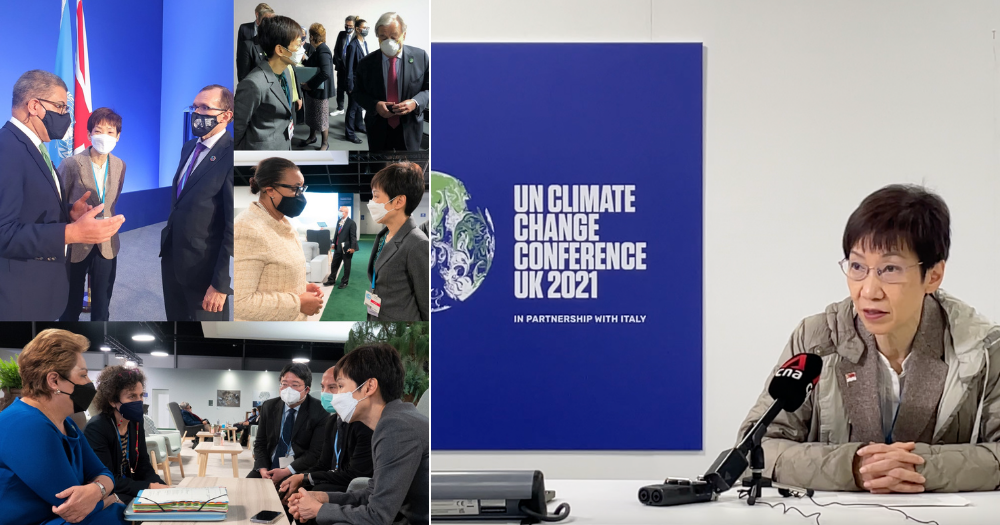Follow us on Telegram for the latest updates: https://t.me/mothershipsg
REPORTING FROM GLASGOW, SCOTLAND
World leaders had reconvened in Glasgow after two years to enhance their climate commitments over the past two weeks.
One of the key tasks was to agree on the rulebook for global carbon market, also known as the Article 6 of the Paris Agreement.
Article 6 was the most significant and challenging task at this year's global climate summit COP26.
It covers the rules for global carbon market to function and was left unresolved since 2015 when countries met in Paris for climate negotiations.
Creating a market for carbon trading among countries is deemed as a way to limit carbon emissions collectively.
Singapore's Minister for Sustainability and the Environment Grace Fu and Norway's Climate and Environment Minister Espen Barth Eide were tasked to be the co-facilitators of the ministerial consultations for Article 6.
Approaching crunch time at @COP26 - 24 hours before the summit is scheduled to end, we still have several open issues, but also remarkable people from all around the 🌎 doing their very best. Here with Minister Grace Fu of 🇸🇬 and 🇳🇴 @kldep colleagues. 🇺🇳🇬🇧 pic.twitter.com/8Zx7Li8Jfj
— Espen Barth Eide (@EspenBarthEide) November 11, 2021
Article 6 finalised after 6 years
The rulebook for Article 6 was finalised on Nov. 13, when COP26 officially concluded with a deal after negotiations overran for a day.
Country leaders agreed on reporting standards and a five-year time frame to update Nationally Determined Contributions (NDCs).
The Article 6 also includes a mandatory share-of-proceeds contribution of five per cent and a monetary levy to the Adaptation Fund for countries that are most affected by the climate crisis.
In addition, a Glasgow Committee on Non-Market Approaches was established so countries that do not take part in carbon markets can also benefit in areas such as adaptation and mitigation, resilience and sustainability, circular economy and blue carbon.
On behalf of the Singapore 🇸🇬 delegation, I would like to thank you @AlokSharma_RDG & your team for leading us to a successful #COP26
Where Paris promised, #Glasgow delivered, esp finalising the #ParisAgreement Rulebook
🇸🇬 pleased to support🇬🇧 as co-facilitator of #Art6 pic.twitter.com/mUij629WPY
— Joseph Teo (@JosephTeoSG) November 13, 2021
Reflecting on taking up co-facilitator role for Article 6
Recalling the initial reactions to her taking up the role, Fu said:
"I was told that when I accepted the role of co-facilitating Article 6, other ministers offered their condolences because it's one of those, I would say until now, perennial issues that is complicated."
At a round-up media interview in Glasgow, she described Article 6 as a bowl of spaghetti with "a strand coming from ambition, a strand coming from finance, and strands coming from things like share of proceeds and transparency".
Adding on to the complexity is a fear that carbon market may dilute climate ambitions or it may ended up to be a form of greenwashing if it's not done right, Fu said.
Joseph Teo, the chief negotiator for climate change, tweeted the following update during the negotiations:
#Article6 Co-facilitators Ministers🇸🇬Grace Fu &🇳🇴@EspenBarthEide updating Parties on the status of Art 6 negotiations
Parties are moving in the right direction but there are still issues we need to find common ground
With compromise & support from all, we can get this done pic.twitter.com/L5DZ7aQ2za
— Joseph Teo (@JosephTeoSG) November 11, 2021
Despite the challenges involved, Fu accepted the role to co-facilitate the consultations on Article 6.
"It is a heavy responsibility, but it demonstrates our long-standing support for the multilateral process and our strong desire to make COP26 a success," Fu said at the round-up media interview.
Consultation work started at least six months ago
Fu and her Norwegian counterpart took six months to consult various ministers.
The process was made as transparent and inclusive as possible, including groups that representing groups of countries such as the Alliance of Small Island States, Fu told the media.
Alliance of Small Island States include 39 member countries such as Singapore, Papua New Guinea, Cuba and Timor-Leste.
These rounds of discussions helped the team to narrow down the critical issues and so at COP26, countries were able to focus on a few political issues that require leadership to sort it out.In preparation for COP26, experts also took months to sort out the technical details so that the team is clear of what can be discussed and negotiated in the package.
"It wasn't easy," Fu admitted.
"Some of the positions are very entrenched, because you can imagine you didn't agree for five years and how is it you can make agreement for this?"
Fortunately, the team was able to seed new proposals and get out of the box with the help of many parties involved who want to see Article 6 to be completed.Fu said that the co-facilitators sought to encourage discussions, and they were not there to negotiate with the parties.
"We are there to get people to come to the table, sit down and say what's important to you. Let them hear from each other what are their concerns and then offer text as we see."
For example, the share of proceeds was important to some of the developing countries so the co-facilitators put out that agenda and proposed text for people to work on, Fu described.
Recognising contributions from Singapore delegation
While all eyes are on the outcome of Article 6, Fu added that countries looked at what they would get out from the whole package; if they gave in on Article 6 they might be looking at getting something else from the package.
Fu gave credit to the "able leadership" UK COP26 Presidency and UNFCCC Secretariat for landing a package at COP26.
In addition, Fu also gave credit to members of the Singapore delegation who have contributed in facilitating the negotiations at the expert level across multiple tracks.
She named three individuals at the round-up interview and they are:
1. Peter Govindasamy from the Ministry of Trade and Industry
He co-chairs the Katowice Committee of Experts on the Impact of the Implementation of Response Measures;
2. Diane Tan from the Attorney-General's Chambers
She has helped to lay down the Rules of Procedure for the work of the Paris Agreement Implementation and Compliance;
3. Cheah Sin Liang from the National Climate Change Secretariat
He has facilitated the Subsidiary Body for Implementation discussions on Terms of Reference for the Consultative Group of Experts, and financial and technical support for developing countries' reporting.
Related story
Follow and listen to our podcast here
Top image via Mothership video screenshot and Grace Fu's Facebook
If you like what you read, follow us on Facebook, Instagram, Twitter and Telegram to get the latest updates.

